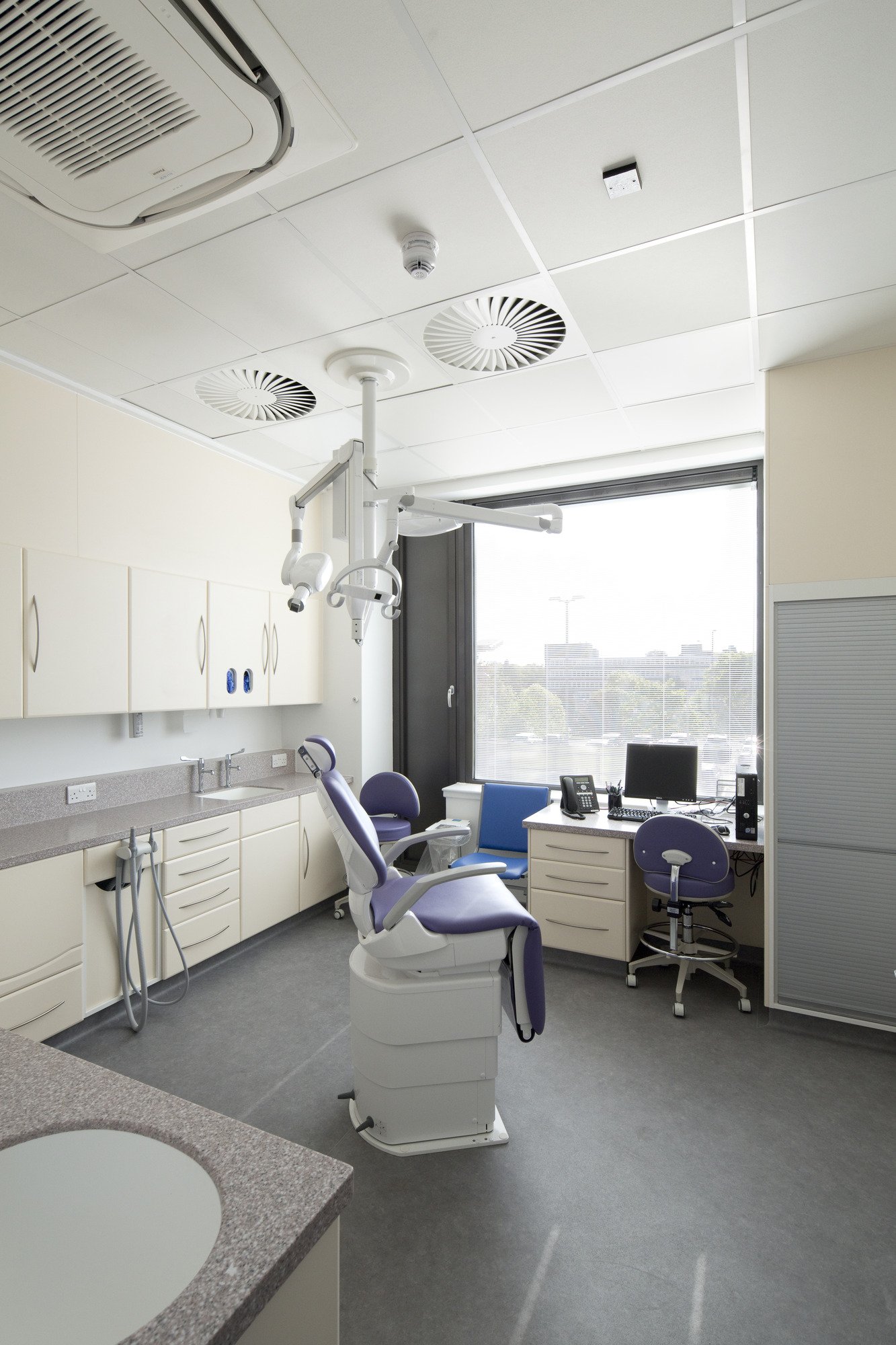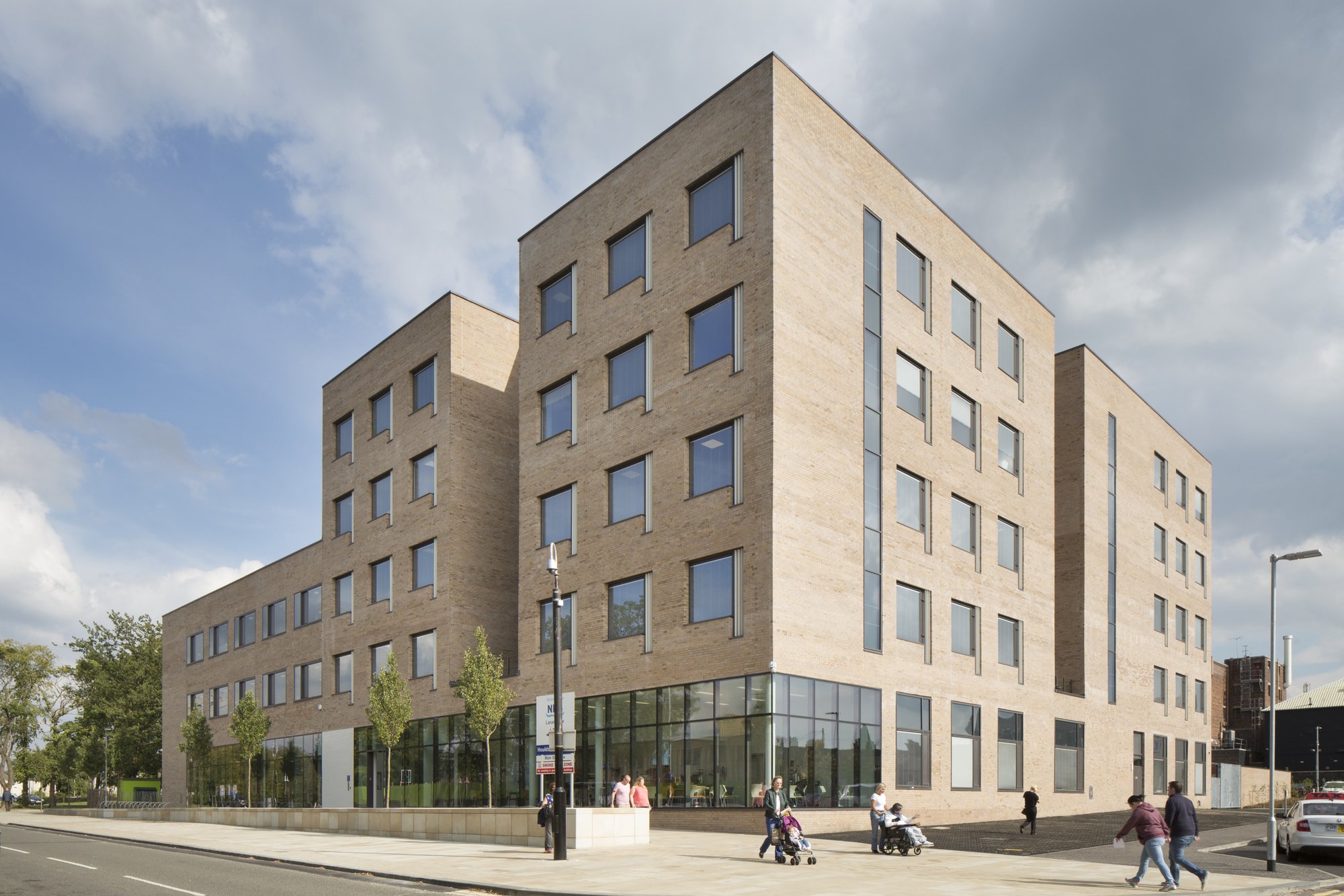East Kilbride Health Centre
North Lanarkshire Health Centres - East Kilbride for NHS Lanarkshire
“This new state-of-the-art facility will allow our healthcare staff to enhance the first-class care they already provide to the people of East Kilbride. As modern healthcare evolves to enable the delivery of health and social care services in community settings, this fantastic facility is ideally equipped to help us do this.” - Calum Campbell, NHS Lanarkshire Chief Executive
A major health centre accommodating seven GP practices, NHS clinical services and NHS office accommodation. The new centre is adjacent to the original Hunter Health Centre, whose site is now taken up by a dedicated car park. Thus, connections into the community which are so important for such a facility are preserved.
We sought to create an architecture of simplicity and rationalism; a design that embodies constructive and diagrammatic logic and avoids unnecessary formal gestures and resources. The architectural idea was to create an impressive, brightly lit, social space within the heart of the building that the entire community of building users engage with. All of the building’s spaces are gathered around the central space - an enclosed atrium, with views out.
The square geometry and the atrium emerge from the requirements of the brief. They provide efficiency and economy of movement and services. This economic tight footprint is particularly suited to the site. The building user has less far to move if the building is vertically orientated - the patient journey is always kept to a minimum. The vertical circulation ensures there is no need for users to travel through one department to get to another. The square plan allows for economic ratio of external envelope to floor area and an efficient gross-net ratio of floor area.
Within the schedules of accommodation each GP practice and NHS department has a space allocation reflecting its present size. In the longer term the size and number of practices/departments may change, and the closed nature of the plan makes it possible for the physical boundaries between territories to be amended with little or no impact on the building itself.
Most patients visiting health centres are heading for a clear destination, such as a specific GP practice or NHS clinical accommodation, and they will learn rapidly to find their way. Clear wayfinding is achieved by the excellent visibility up through the atrium and the orientation provided by the coloured stair core in one corner. Segregation of staff and service routes away from patient areas has been provided via double circulation routes.
Rooms with differing functions have been standardised to a size and proportion which makes them all suitable as potential consulting/examination rooms, enabling the precise use of each room to evolve over time. This basic room caters for around 23 separate briefed functions.
NHS Lanarkshire identified a desire to form a common identity shared by their three new health centres, giving NHSL an identifiable presence in Wishaw, Kilsyth and East Kilbride. This identity relies on the use of good quality materials, with crisp, yet robust detailing.
A powerful statement was required from this skyline building adjacent to the brutalist Civic Centre. This is provided by the cube form, in a strong red brick, with generous square windows repeated throughout, lightened by white grillage over tall opening vents and softened by the introduction of curved screen walls at roof level.
-
Contract Value
£12M
Area
6,170m2
Completion
2015
Client
NHS Lanarkshire
Contract
HubDBFM
-
Architects - Reiach and Hall Architects
Main Contractor - Graham Construction
Structural Engineer - AECOM
Services Engineer - Hulley & Kirkwood
Quantity Surveyor - Currie & Brown
Landscape Architect - Horner & MacLennan
-
Awards
Scottish Design Awards - Healthcare Building Award 2016
-
A major health centre accommodating seven GP practices, NHS clinical services and NHS office accommodation.
The new centre is adjacent to the original Hunter Health Centre, whose site is now taken up by a dedicated car park. Thus, connections into the community which are so important for such a facility are preserved.
We sought to create an architecture of simplicity and rationalism; a design that embodies constructive and diagrammatic logic and avoids unnecessary formal gestures and resources. The architectural idea was to create an impressive, brightly lit, social space within the heart of the building that the entire community of building users engage with. All of the building’s spaces are gathered around the central space - an enclosed atrium, with views out.
The square geometry and the atrium emerge from the requirements of the brief. They provide efficiency and economy of movement and services. This economic tight footprint is particularly suited to the site. The building user has less far to move if the building is vertically orientated - the patient journey is always kept to a minimum. The vertical circulation ensures there is no need for users to travel through one department to get to another. The square plan allows for economic ratio of external envelope to floor area and an efficient gross-net ratio of floor area.
Within the schedules of accommodation each GP practice and NHS department has a space allocation reflecting its present size. In the longer term the size and number of practices/departments may change, and the closed nature of the plan makes it possible for the physical boundaries between territories to be amended with little or no impact on the building itself.
Most patients visiting health centres are heading for a clear destination, such as a specific GP practice or NHS clinical accommodation, and they will learn rapidly to find their way. Clear wayfinding is achieved by the excellent visibility up through the atrium and the orientation provided by the coloured stair core in one corner. Segregation of staff and service routes away from patient areas has been provided via double circulation routes.
Rooms with differing functions have been standardised to a size and proportion which makes them all suitable as potential consulting/examination rooms, enabling the precise use of each room to evolve over time. This basic room caters for around 23 separate briefed functions.
NHS Lanarkshire identified a desire to form a common identity shared by their three new health centres, giving NHSL an identifiable presence in Wishaw, Kilsyth and East Kilbride. This identity relies on the use of good quality materials, with crisp, yet robust detailing.
A powerful statement was required from this skyline building adjacent to the brutalist Civic Centre. This is provided by the cube form, in a strong red brick, with generous square windows repeated throughout, lightened by white grillage over tall opening vents and softened by the introduction of curved screen walls at roof level.
Sketchbook




Site Photographs






















